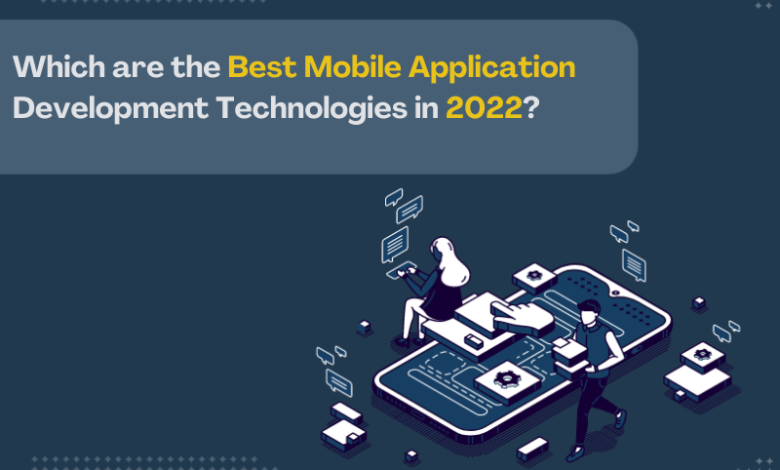Which are the Best Mobile Application Development Technologies in 2022?

Which mobile application development technologies will be the best in 2022? There is a good reason why so many developers are asking themselves this question. There are always new platforms and tools appearing on the app market. If you want your apps to succeed in 2022, you need to be using the right technology stack. So which technologies should you be focusing on? From Cross-platform, native to Mobile Backend as a Service, we have it all. Read on to get the best overview of all the best Mobile App Development Technologies of 2022.
Best Mobile App Development Technologies
Mobile app development technologies are needed for creating apps for smartphones. There are many different mobile app development technologies available, and the best one for you will depend on your specific needs. In this article, we will take a look at some of the best mobile app development technologies in 2022.
Cross-platform Mobile App Development Tools
One of the most popular mobile app development tools is cross-platform development tools. These allow you to develop your app once & then deploy it to different platforms. This can save you a lot of time and money, as you only need to develop your app once. Some of the cross-platform mobile app development tools are:
React Native: Facebook developed React Native as a tool for developing cross-platform mobile apps. It allows you to develop your app using JavaScript and React, and then deploy it to iOS and Android.
Xamarin: Xamarin is another popular hybrid mobile app development tool. It helps in developing your app using C# and .NET, and then deploy it to iOS, Android, Windows Phone, and more.
Ionic: Ionic is a popular open source framework for cross-platform mobile apps. It allows you to develop your app using HTML5, CSS3, and JavaScript, and then deploy it to iOS, Android, Windows Phone, and more.
Native Mobile Application Development Tools
If you want to develop an app specifically for one platform, then you will need to use native application development tools. These are designed specifically for the platform that you want to target, such as iOS or Android. Some of the most popular native mobile app development tools include:
Swift: Swift is a popular native app development tool for iOS. It is developed by Apple and allows you to develop your app using the Swift programming language.
Objective-C: Objective-C is another popular native app development tool for iOS. It is also developed by Apple and allows you to develop your app using the Objective-C programming language.
Java: Java is a popular native app development tool for Android. It allows you to develop your app using the Java programming language.
Mobile Backend as a Service (MBaaS) Tools
If you want to quickly develop and deploy your app, then you may want to consider using Mobile Backend as a Service (MBaaS) tools. These allow you to connect your app to the cloud and use features such as push notifications, user management, storage, and more. Some of the most popular MBaaS providers include:
Firebase: This is a popular MBaaS provider that offers a variety of features for mobile app development.
AWS Mobile: This is a cloud platform from Amazon that offers Mobile Backend as a Service tools.
Azure Mobile: This is a cloud platform from Microsoft that offers Mobile Backend as a Service tools.
The Future of Mobile Application Development Technologies
There’s no doubt that mobile app development technologies have come a long way in recent years. We’ve seen the rise of powerful mobile platforms like iOS and Android, and the emergence of new programming languages and frameworks designed specifically for mobile app development.
Looking ahead to 2022, we can expect even more advances in mobile app development technologies and the emergence of new and top mobile app development company. Here are some of the top mobile app development trends that we’re likely to see over the next few years:
More powerful mobile devices: Mobile devices are getting more powerful every year, with faster processors and more memory. This will enable developers to create even more sophisticated & feature-rich mobile apps.
Improved tools and frameworks: The tools and frameworks available for mobile app development are constantly improving. This makes it easier for developers to create high-quality mobile apps.
More use of artificial intelligence: Artificial intelligence is starting to be used more in mobile apps, for tasks such as image recognition and natural language processing.
Increased use of cloud services: Cloud services are becoming increasingly popular for mobile application development. This allows developers to take advantage of the scalability and flexibility of the cloud, and make their apps available to a wider audience.
Greater focus on security: As mobile devices become more prevalent, there will be an increased focus on ensuring that they are secure. This means that developers will need to pay more attention to security when developing mobile apps.
Rise of mobile payment systems: Mobile payment systems are becoming more popular, as they allow users to make payments using their mobile devices.
These are just some of the trends we’re likely to see in mobile app development over the next few years. With the continued advances in mobile technologies, the sky’s the limit for what developers will be able to achieve.
Last Say
In conclusion, there are many different mobile app development technologies available, and it depends on what you need. Use hybrid mobile development tools if you wish to build an app that works on multiple platforms. For development of apps for specific platforms, you should consider native app development tools. And if you want to quickly develop and deploy your app, then you may want to consider using Mobile Backend as a Service tools. Get a detailed look into your needs and begin your dream project soon.
Author’s Bio
Erma Winter is an expert Android app developer at MobileCoderz, an established Top Mobile App Development Company. With 12 years of expertise, she has worked with big startups and SMEs. Going above professionalism, she loves to read mystery novels and write poems.




